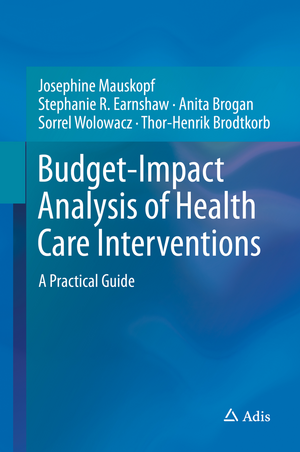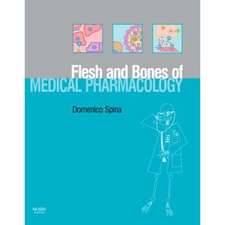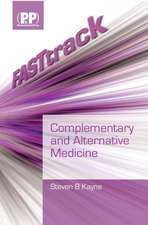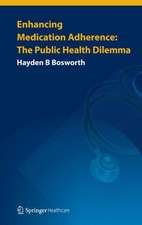Budget-Impact Analysis of Health Care Interventions: A Practical Guide
Autor Josephine Mauskopf, Stephanie R. Earnshaw, Anita Brogan, Sorrel Wolowacz, Thor-Henrik Brodtkorben Limba Engleză Hardback – 15 aug 2017
The book progresses from a framework for budget impact analyses to an in-depth review of components and how to develop and present these in software applications and reports. Critical considerations such as uncertainty analysis and validation, and considerations for alternate interventions, such as vaccines and diagnostics, are also covered.
This book is a “must have” for the builder and budget holder, with builders benefiting from instructions to identify and estimate all necessary variables and budget holders receiving a guide to what should be included in the analyses they assess.
| Toate formatele și edițiile | Preț | Express |
|---|---|---|
| Paperback (1) | 550.40 lei 38-44 zile | |
| Springer International Publishing – 13 mai 2018 | 550.40 lei 38-44 zile | |
| Hardback (1) | 782.72 lei 38-44 zile | |
| Springer International Publishing – 15 aug 2017 | 782.72 lei 38-44 zile |
Preț: 782.72 lei
Preț vechi: 823.91 lei
-5% Nou
Puncte Express: 1174
Preț estimativ în valută:
149.79€ • 162.65$ • 125.82£
149.79€ • 162.65$ • 125.82£
Carte tipărită la comandă
Livrare economică 18-24 aprilie
Preluare comenzi: 021 569.72.76
Specificații
ISBN-13: 9783319504803
ISBN-10: 3319504800
Pagini: 240
Ilustrații: XVIII, 224 p. 30 illus., 3 illus. in color.
Dimensiuni: 155 x 235 x 22 mm
Greutate: 0.56 kg
Ediția:1st ed. 2017
Editura: Springer International Publishing
Colecția Adis
Locul publicării:Cham, Switzerland
ISBN-10: 3319504800
Pagini: 240
Ilustrații: XVIII, 224 p. 30 illus., 3 illus. in color.
Dimensiuni: 155 x 235 x 22 mm
Greutate: 0.56 kg
Ediția:1st ed. 2017
Editura: Springer International Publishing
Colecția Adis
Locul publicării:Cham, Switzerland
Cuprins
1. Introduction to Budget-Impact Analysis.- 2. Determining the Analytic Framework.- 3. Estimating the Diagnosed, Treated, and Eligible Population.- 4. Estimating the Treatment Mix.- 5. Estimating Treatment-Related Costs.- 6. Estimating Condition-Related Costs.- 7. The Computing Framework and Calculations.- 8. Uncertainty Analysis.- 9. Validation.- 10. Software and Computer Interface.- 11. Reporting Budget-Impact Analyses.- 12. Additional Pragmatic Topics.- 13. Alternative Interventions.- 14. Creating Your Own Budget-Impact Analyses Today and Tomorrow.
Notă biografică
Josephine A. Mauskopf, PhD, MHA, MA
Josephine Mauskopf is Vice President of Health Economics at RTI Health Solutions. She has been on the International Society of Pharmacoeconomics and Outcomes Research (ISPOR) Board of Directors and was co-chair of the first and second ISPOR Task Force for budget-impact analysis. Dr. Mauskopf was Department Head of Economics Research at Burroughs Wellcome Co. and Director of Pharmacoeconomics Research for Anti-Virals and Anti-Infectives at Glaxo Wellcome Inc.
Her research interest is in designing and implementing pharmacoeconomic research strategies and programs for the pharmaceutical industry.
She has published over 100 articles and written an encyclopedia entry for budget-impact analysis. She has served as Editor-in-Chief of Value in Health and is an Associate Editor for Medical Decision Making. Dr. Mauskopf was also the recipient of the 2013 Avedis Donabedian Lifetime Achievement Award.
Stephanie R.Earnshaw, PhD, MS
Stephanie Earnshaw is Senior Vice President of Health Economics at RTI Health Solutions. She has also had an adjunct professor appointment in the University of North Carolina (UNC) Eshelman School of Pharmacy, Division of Pharmaceutical Outcomes and Policy. Prior to joining RTI Health Solutions, Dr. Earnshaw worked in UNC’s School of Public Health as the Operations Director of the Survey Research Unit and taught courses in the Kenan-Flagler Business School.
Her research interest is primarily in applying decision analytic techniques to novel pharmacoeconomic and outcomes research problems for the pharmaceutical industry.
She has published 47 articles and has written 3 book chapters. She has taught short courses and distance learning courses for the International Society for Pharmacoeconomics and Outcome Research and is on the editorial board of PharmacoEconomics – Open.
Josephine Mauskopf is Vice President of Health Economics at RTI Health Solutions. She has been on the International Society of Pharmacoeconomics and Outcomes Research (ISPOR) Board of Directors and was co-chair of the first and second ISPOR Task Force for budget-impact analysis. Dr. Mauskopf was Department Head of Economics Research at Burroughs Wellcome Co. and Director of Pharmacoeconomics Research for Anti-Virals and Anti-Infectives at Glaxo Wellcome Inc.
Her research interest is in designing and implementing pharmacoeconomic research strategies and programs for the pharmaceutical industry.
She has published over 100 articles and written an encyclopedia entry for budget-impact analysis. She has served as Editor-in-Chief of Value in Health and is an Associate Editor for Medical Decision Making. Dr. Mauskopf was also the recipient of the 2013 Avedis Donabedian Lifetime Achievement Award.
Stephanie R.Earnshaw, PhD, MS
Stephanie Earnshaw is Senior Vice President of Health Economics at RTI Health Solutions. She has also had an adjunct professor appointment in the University of North Carolina (UNC) Eshelman School of Pharmacy, Division of Pharmaceutical Outcomes and Policy. Prior to joining RTI Health Solutions, Dr. Earnshaw worked in UNC’s School of Public Health as the Operations Director of the Survey Research Unit and taught courses in the Kenan-Flagler Business School.
Her research interest is primarily in applying decision analytic techniques to novel pharmacoeconomic and outcomes research problems for the pharmaceutical industry.
She has published 47 articles and has written 3 book chapters. She has taught short courses and distance learning courses for the International Society for Pharmacoeconomics and Outcome Research and is on the editorial board of PharmacoEconomics – Open.
Textul de pe ultima copertă
The first of its kind for budget-impact analysis, this comprehensive guide provides clear and concise instructions for evaluating the impact that new pharmaceuticals will have on the budget for a specific jurisdiction. The book demonstrates how to create a budget-impact analysis using a simple six-step process that is consistent with current guidelines for these analyses. Examples and exercises for each chapter afford an opportunity to practice the six-step process in practical applications.
The book progresses from a framework for budget impact analyses to an in-depth review of components and how to develop and present these in software applications and reports. Critical considerations such as uncertainty analysis and validation, and considerations for alternate interventions, such as vaccines and diagnostics, are also covered.
This book is a “must have” for the builder and budget holder, with builders benefiting from instructions to identify and estimate all necessary variables and budget holders receiving a guide to what should be included in the analyses they assess.
The book progresses from a framework for budget impact analyses to an in-depth review of components and how to develop and present these in software applications and reports. Critical considerations such as uncertainty analysis and validation, and considerations for alternate interventions, such as vaccines and diagnostics, are also covered.
This book is a “must have” for the builder and budget holder, with builders benefiting from instructions to identify and estimate all necessary variables and budget holders receiving a guide to what should be included in the analyses they assess.
Caracteristici
Presents a 6-step process that makes building drug budget-impact analyses easy to understand Detailed descriptions of analytic framework components facilitate the building of analyses customized for specific jurisdictions A computing framework enables the reader to differentiate between a static and dynamic approach to budget-impact analysis and identify when each is the appropriate option Exercises associated with each chapter allow the reader to apply the material presented to real-life issues in building budget-impact analyses










